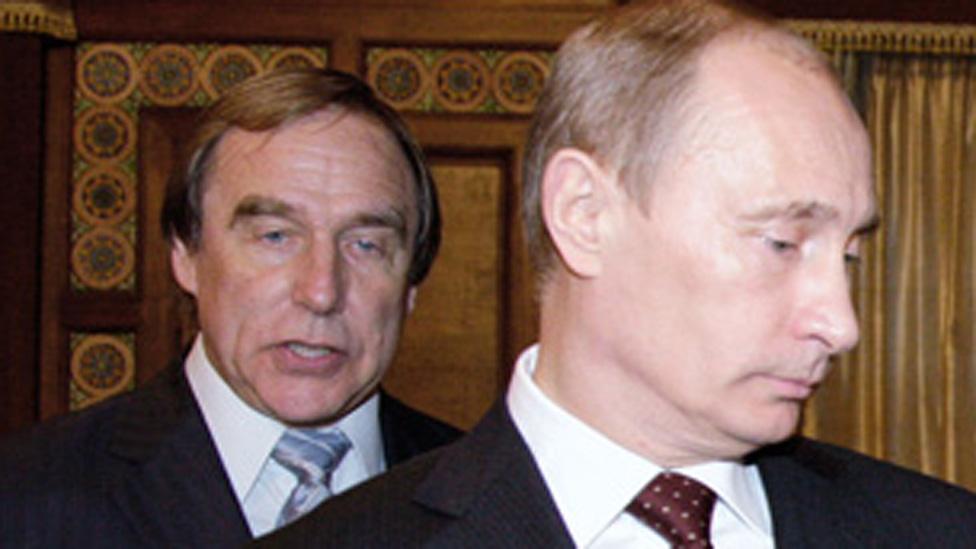Russia's Valery Gergiev conducts concert in Palmyra ruins
- Published
Russian maestro plays in Palmyra ruins
A renowned Russian conductor has led a concert in the ruins of Palmyra in Syria, which were recaptured from the so-called Islamic State (IS) in March.
Valery Gergiev, a supporter of Russia's President Vladimir Putin, conducted the Mariinsky Symphony Orchestra, from St Petersburg, at Palmyra's Roman Theatre.
Last July, IS posted footage online showing some of its fighters carrying out killings in the ancient theatre.
Syrian forces, backed by Russian air strikes, retook the historic site.
Mr Gergiev led the orchestra through pieces by Johann Sebastian Bach, Sergei Prokofiev and Rodion Shchedrin, in front of a crowd of Russian soldiers, government ministers and journalists.
Pictures of the concert, broadcast on Russian state television, were occasionally interrupted by footage of military action - showing Russian military backing for Syrian government forces as they liberated Palmyra from IS militants.
Parts of the ancient city of Palmyra were reduced to rubble by the jihadists
Mr Gergiev was until recently principal conductor of the London Symphony Orchestra and is music director of the Munich Philharmonic Orchestra.
In 2014, he backed Mr Putin over the annexation of the Crimea from Ukraine. In 2008, he performed in the capital of South Ossetia when Russia and Georgia were fighting over the territory.
The maestro described the concert as a protest against the barbarism and violence exhibited by Islamic State militants who had used the city's Roman amphitheatre to execute prisoners.
The Russian president also addressed the audience, by video link from his Black Sea residence in Sochi.
He called terrorism a contagion of which the world needed to rid itself, and said the fact the concert was taking place at all was "surprising".
"Today's action involved major inconvenience and dangers for everyone, being in a country at war close to where hostilities are still ongoing. That has demanded great strength and personal courage from you all," he said.
However, UK Foreign Secretary Philip Hammond said the concert was "a tasteless attempt to distract attention from the continued suffering of millions of Syrians. It shows that there are no depths to which the regime will not sink".

Analysis: Steve Rosenberg, BBC News, Moscow
This is about more than just music.
By organising a concert in the ruins of Palmyra, Russia wants the world to see that it is making a positive contribution in Syria: bringing peace and stability to the country, and, in the case of Palmyra, saving a Unesco heritage site.
Moscow will be hoping that images of its classical musicians in Syria will reinforce the message that Russia is a force for good.
Such a musical message will be well received back home. For months now, Russian TV has been assuring viewers Russia's military intervention in Syria has benefited the world by taking on international terrorism.
But Western officials remain suspicious of Russia's intentions. Moscow has faced accusations that it has not done enough to rein in Syrian government forces. The Russians deny that and accuse America of not using its influence with the Syrian opposition to halt the fighting.

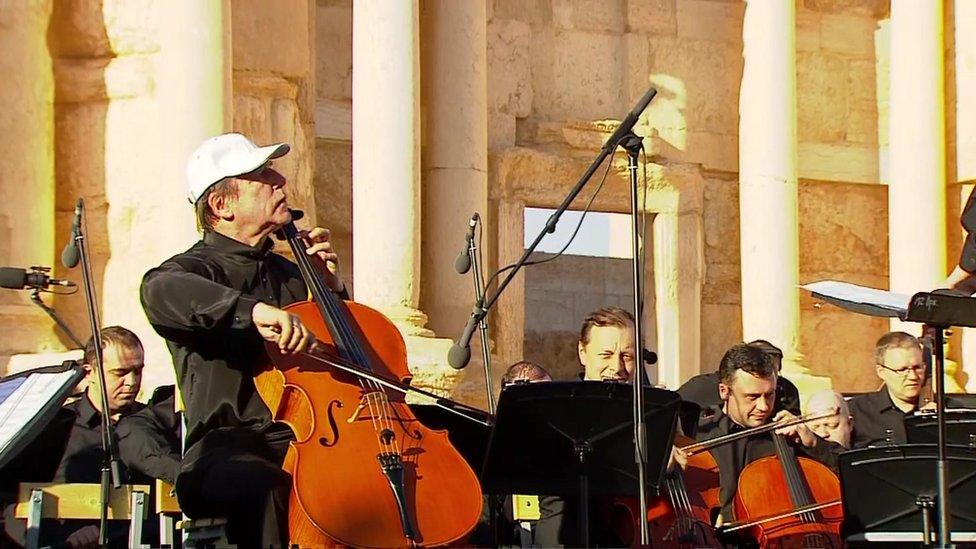
Cellist Sergei Roldugin is a close friend of Vladimir Putin
One of the soloists at the concert was cellist Sergei Roldugin, a friend of Putin's, who was recently named as the owner of offshore companies in the so-called Panama Papers. He denies all wrongdoing.
Islamic State destroyed a number of monuments during its 10-month occupation of Palmyra and its associated Unesco World Heritage site.
Two 2,000-year-old temples, an arch and funerary towers were left in ruins.
The jihadist group, which has also demolished several pre-Islamic sites in neighbouring Iraq, believes that such structures are idolatrous.
While some treasured monuments were destroyed, much of the historic site was left undamaged.
Precedent
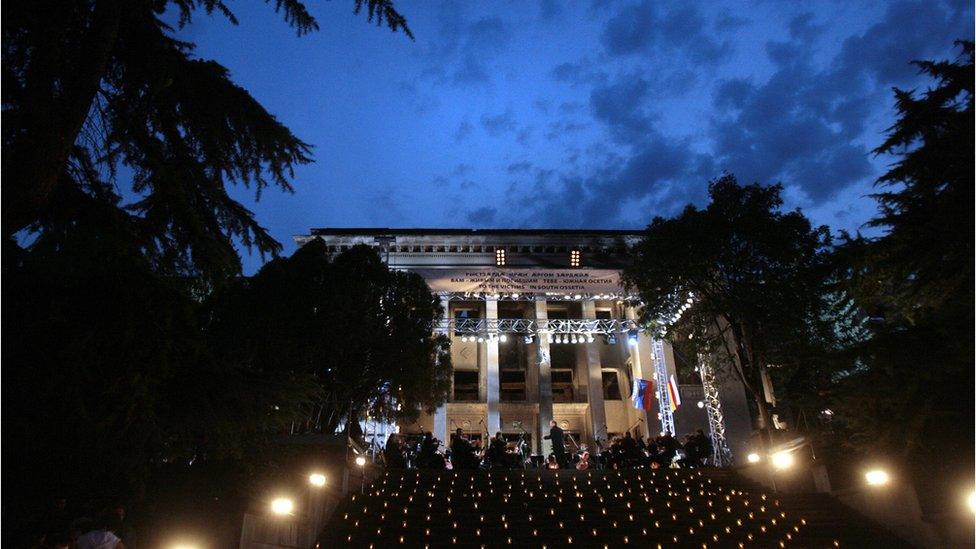
Valery Gergiev performed in South Ossetia in August 2008, after Russia invaded the separatist Georgian region
It is not the first time Mr Gergiev has performed in a war-torn city.
In August 2008, the native Ossetian conductor took the Mariinsky Theatre Symphony Orchestra to the ruins of Tskhinvali in the separatist Georgian region of South Ossetia, heavily damaged in the short Russian-Georgian war that year.
Mr Gergiev also conducted a charity concert in Tokyo for victims of the Fukushima nuclear disaster in 2012, and he led a charity concert tour to raise funds for victims of Russia's Beslan school massacre in 2004.
- Published1 April 2016
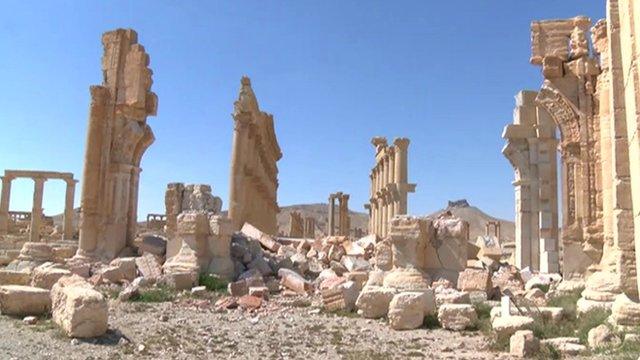
- Published5 October 2015
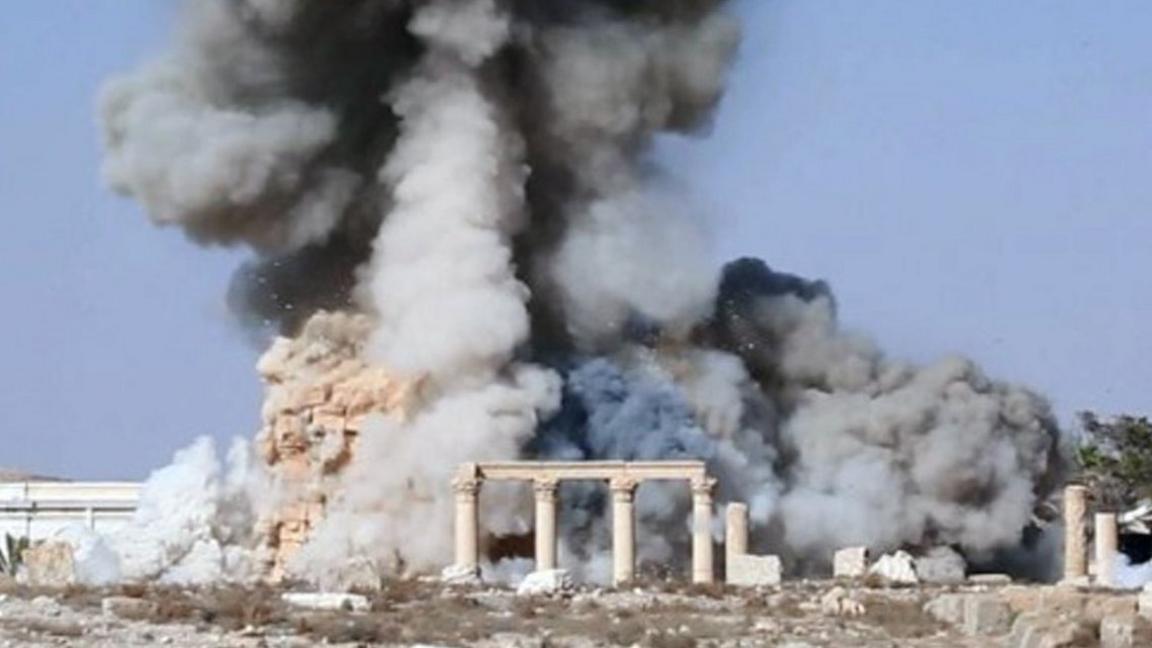
- Published5 October 2015

- Published3 April 2016
